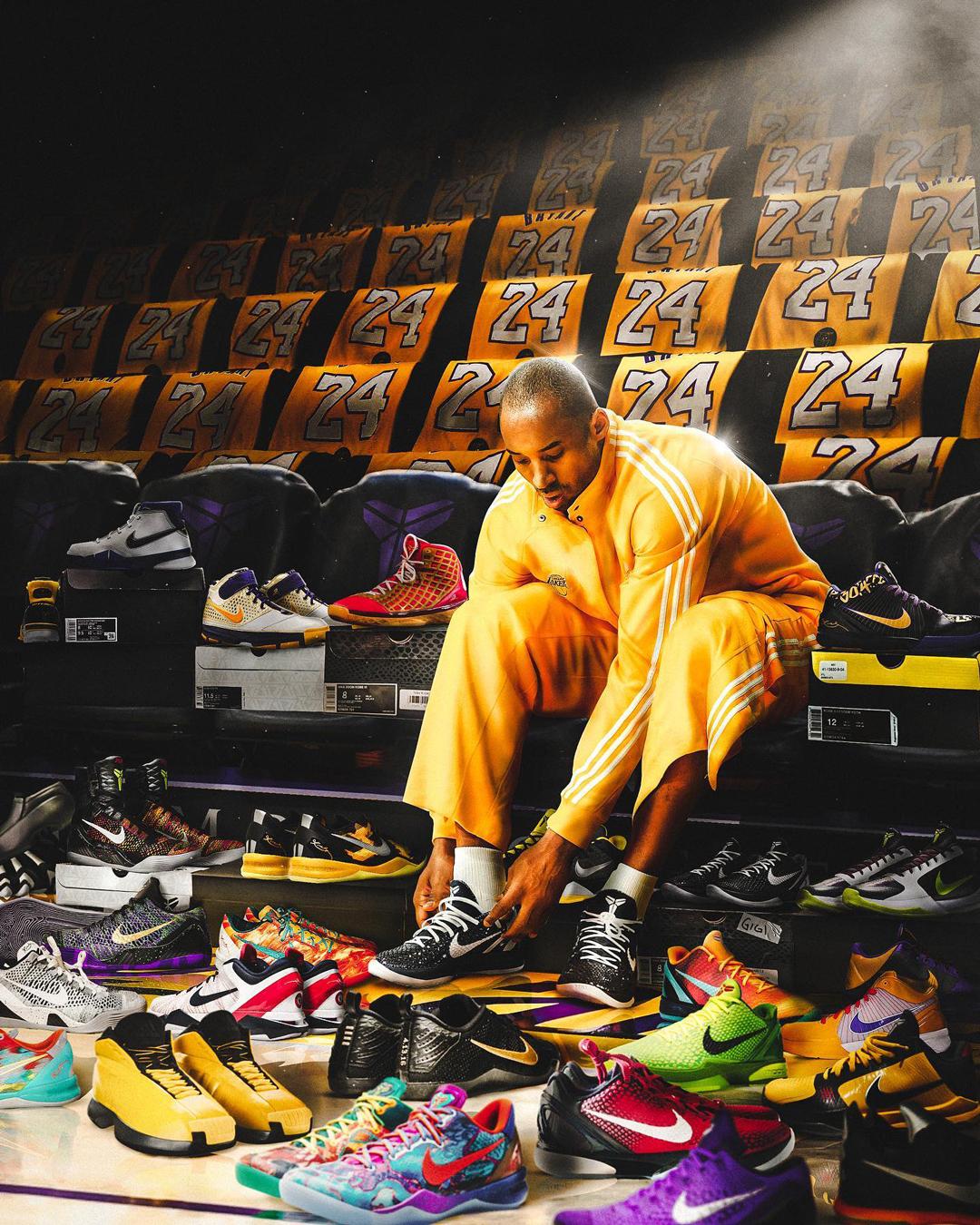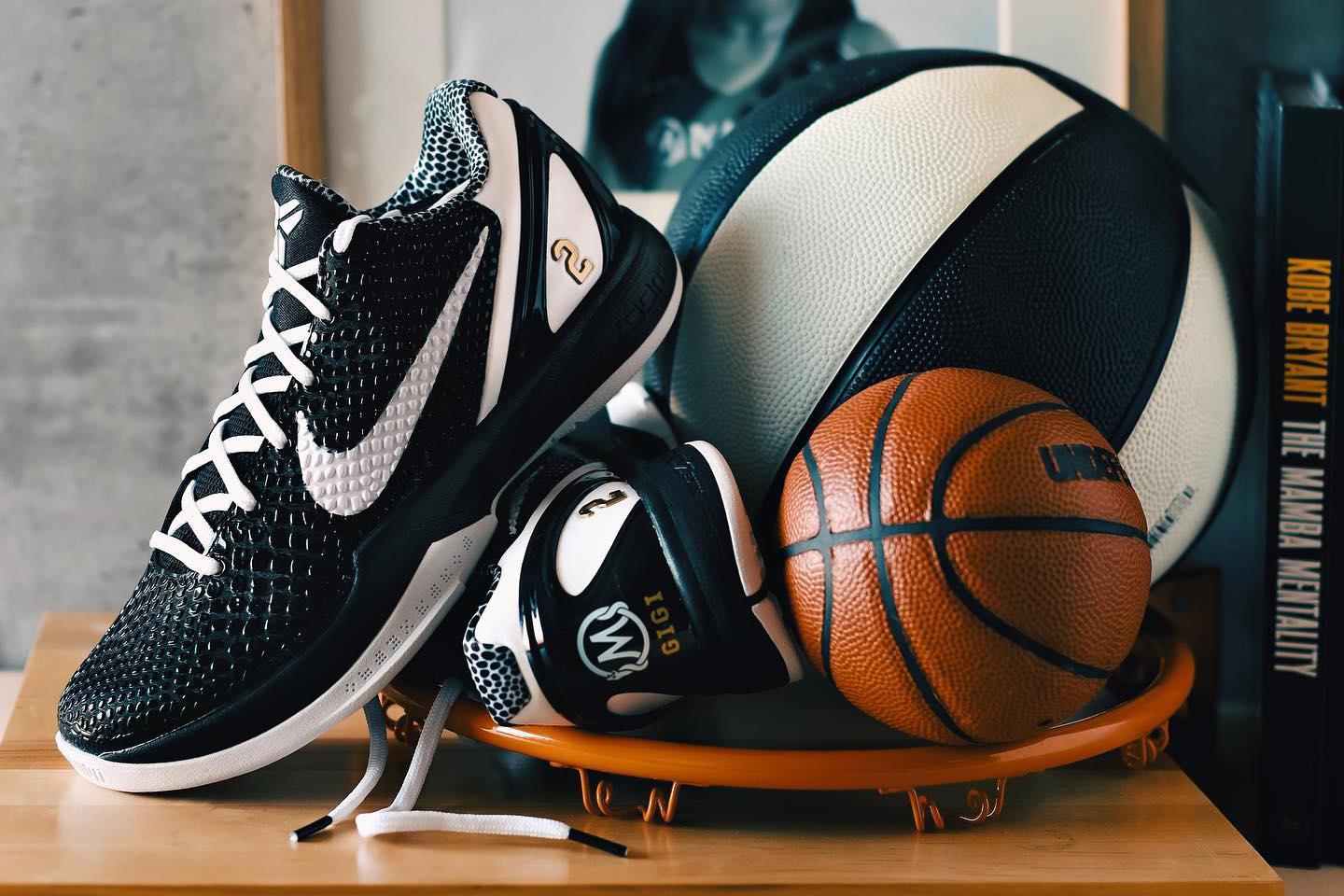Kobe Bryant's Shoes Should Be Accessible For Everyone
Since and his daughter Gianna 'Gigi' Bryant tragically passed away in a January 2020 helicopter crash, the demand for Kobe's shoes has skyrocketed among both his peers in the and the general public. It's harder than ever to get your hands on some Kobe kicks unless you're willing to shell out several hundred dollars, and now that Bryant's estate – led by his wife Vanessa – has with , it's important that Bryant's shoes are made as widely available as they possibly can be. We unpack the issue and offer a solution down below.

Desirable sneakers, Kobes included, are usually made in scarce quantities to fulfil one half of the simple rule of supply and demand. If demand outweighs supply and the shoes sell out, then they're a hit. In today's hype-fuelled sneaker market, the right 'who wore what when' co-sign can often be more important than a compelling backstory or a sensible collaboration because all that matters is that the shoes sell out – and, in a perfect world, fetch a handsome sum on the aftermarket.
Nike are no stranger to this economic model, as they both drive it with a swath of valuable, desirable drops and have suffered plenty of blowback from it. Claims that the SNKRS app is rigged and unfair led them to completely overhaul how they proceed with drops, both and finding ways to reward active members through to desirable products. However, they're still frequently dogged by accusations of price gouging and unfairness. It doesn't help that Ann Hebert, the brand's former North American VP/GM stepped down from her position last year, because her son was using a card in her name to acquire stock for his , that son Marcus Jordan has been accused of reselling the that his store collaborated on, or that vexatious resellers like have hinted at having plugs inside the brand who supply their 'boomin' businesses.
Sneaker prices are more eye-watering than ever before, and Kobe Bryant's kicks aren't spared from the exorbitant pricing. Before Bryant's passing, his shoes held some value on the secondary market, but were mostly bought, sold and traded by Nike Basketball aficionados, his fans and people who wanted to play in them – they are some of the finest performance shoes of the last two decades, after all.
After his passing they immediately surged in value, a jump aided by the fact that, at the time, Bryant didn't have an active contract with Nike and it seemed that the existing supply would run out. Even NBA players were . 'I'm hearing about [NBA players] actually buying shoes to play in,' ESPN reporter Brian Windhorst said during a November 2021 appearance on . 'Not to put in their collections, not to wear when they go out on the town, to play in. They're spending $1500 or more on the secondary market.' Though these players could reasonably call these shoes a work expense, it helped set an unfavourable precedent and push prices – and demand – even higher.

Thanks to the renewed partnership between Bryant's estate and Nike, the first problem presented by this surge in attention has been fixed. The Kobe stash isn't running out any time soon. But it's simply not as large as it should be, which has kept aftermarket prices high and made Kobes unobtainable for most buyers. A quick recent sales search on StockX for the , the first Kobe to release after Bryant and Nike's partnership was officially renewed, shows that prices have fluctuated between $500 and $700, with some pairs still cracking the thousand-dollar mark. That's simply not an acceptable amount of money for most people to spend on a pair of sneakers, no matter how much they love the player.
These aftermarket prices are undeniably crazy, but they're entirely expected. It wasn't that long ago that people were reselling disinfectant sprays, face masks and sanitary wipes for huge markups at the beginning of the Coronavirus pandemic, the general good be damned. However, the fault lies just as much with the people who are willing to pay these prices as it does with the shameless opportunists who hawk goods for four times as much as their retail value.
Just because you may be willing to pay $800 for a $180 sneaker doesn't make you a bigger Kobe fan than someone who won't. People who have a true appreciation for Kobes love them for their performance, looks, and the emotional connection they provide to a fallen legend of sport, not how much they're worth. It may seem that this is a problem with no solving. There will always be more people that want Kobes than there will be Kobes available, but don't hate the (aftermarket) player, hate the game. It's actually a simple problem that comes with a simple solution.
For those who are wringing their hands about exclusivity and the joy of having something that someone else doesn't, ask yourself two simple questions: are Kobes the kind of shoes I should apply this line of thinking towards? And secondly, does spending a crazy aftermarket sum on these make me more of a Kobe fan than someone who wouldn't? The answers are simple. No, they're not, and no, it doesn't. If something's truly good, it doesn't matter how available it is, and the interest in Kobes isn't going to subside when their exclusivity does. Some shoes do need to be exclusive for a brand to maintain its cultural stature, but Kobes are not those shoes. Granted, the 'Mambacita Sweet 16' was produced well before Bryant's estate and Nike came to a new agreement, but there's no reason future pairs can't be made in huge quantities.
Nike can do some good from a financial standpoint here too. Profits from the 'Mambacita Sweet 16' went to the Mamba and Mambacita Sports Foundation, which encourages youth participation in sports, and there's no reason that proceeds from all of Bryant's other releases can't be donated either (for the record, both StockX and GOAT are donating net profits from the pairs sold on their platforms to charity as well). Nike clocked roughly $17.36 billion in revenue over the course of 2021, so giving the profits from Kobe products to a worthy cause shouldn't be a challenge.
Let's see Kobes be as widely available as other Swoosh-adorned classics. Tamp down the unnecessary flow of aftermarket dollars, and make the releases make sense for Kobe fans from all walks of life.
Just do it, Nike.

